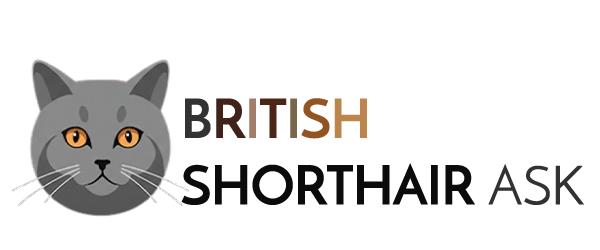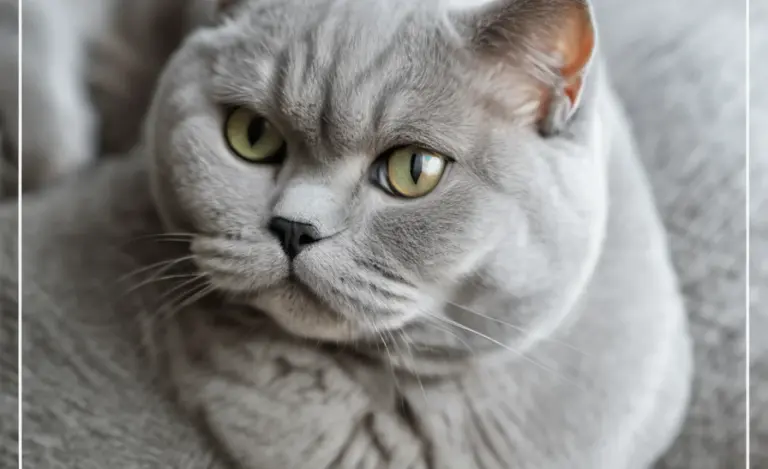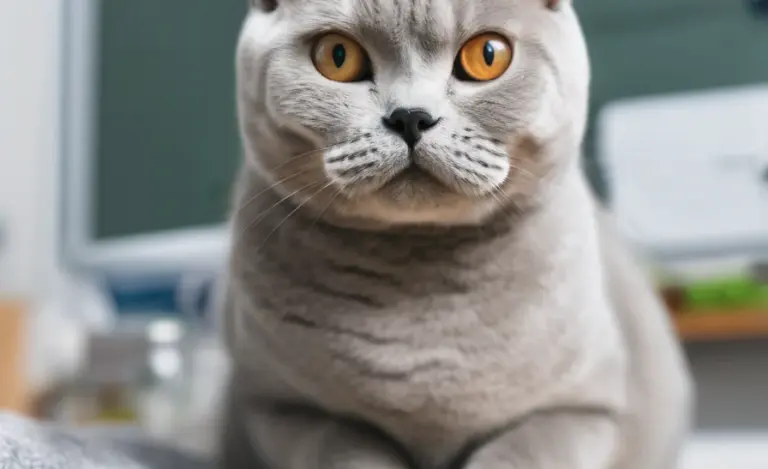Recommended Dental Treats to Prevent Plaque in British Shorthairs
The best dental treats for British Shorthairs to prevent plaque are those that are specifically designed for dental health, VOHC-approved, and appropriately sized for your cat. Look for treats containing ingredients like sodium hexametaphosphate or those with a textured surface to help scrape teeth. Always monitor your cat while they chew, and remember that treats are a supplement to, not a replacement for, regular brushing and vet checkups.
Does your British Shorthair have stinky breath? You’re not alone! Many British Shorthair owners struggle with their cat’s dental health. Plaque buildup is a common problem that can lead to serious issues if left unchecked. Luckily, there’s a simple and tasty solution: dental treats! Choosing the right dental treats can be confusing, but don’t worry. I’ll walk you through the best options, how they work, and how to make them a part of your British Shorthair’s daily routine. Let’s get that kitty smiling!
Understanding Plaque and Dental Disease in British Shorthairs
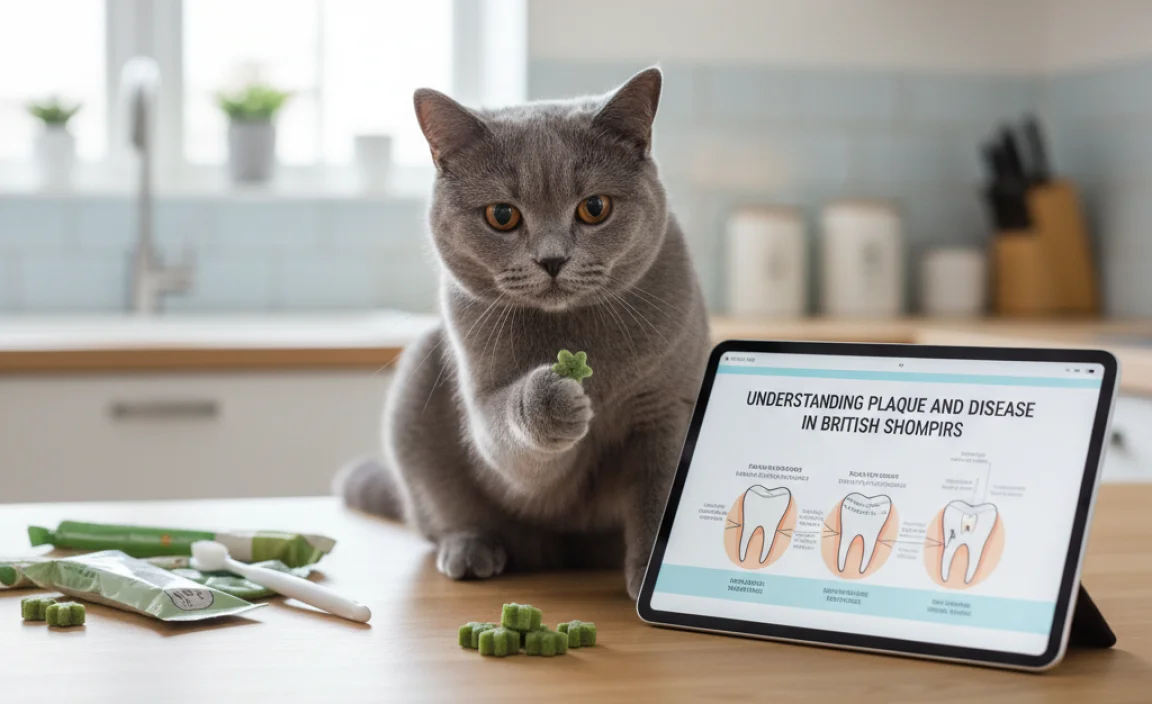
Before we dive into dental treats, let’s talk about why they’re so important. British Shorthairs are prone to dental issues, just like any other cat breed. According to the Cornell Feline Health Center, dental disease affects a significant percentage of cats by the time they reach just three years old.
Here’s a quick rundown:
- Plaque: A sticky film of bacteria that constantly forms on your cat’s teeth.
- Tartar (Calculus): Plaque that has hardened due to mineral deposits from saliva.
- Gingivitis: Inflammation of the gums, often caused by plaque and tartar.
- Periodontitis: Advanced gum disease that damages the tissues supporting the teeth, potentially leading to tooth loss.
Left untreated, dental disease can cause pain, difficulty eating, and even systemic health problems as bacteria enter the bloodstream. That’s why preventative care, including dental treats, is crucial for your British Shorthair’s well-being.
Choosing the Right Dental Treats: What to Look For
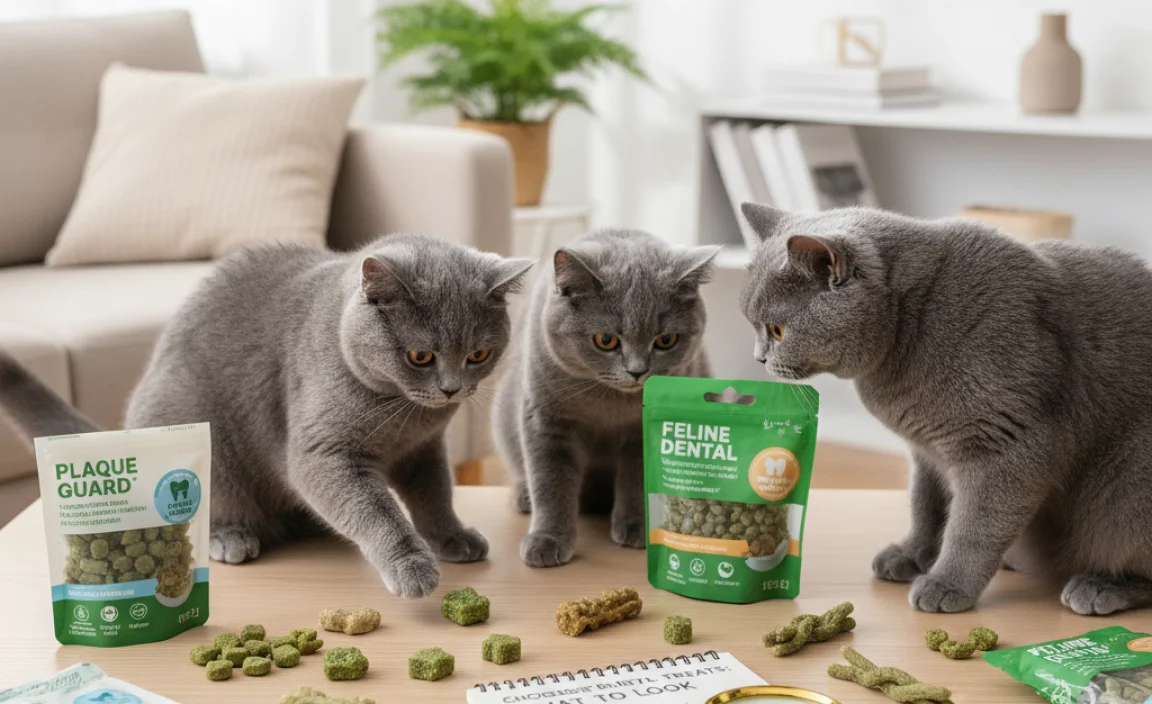
With so many dental treats on the market, it can be hard to know where to start. Here’s a breakdown of the key factors to consider when choosing the best dental treats for your British Shorthair:
1. Veterinary Oral Health Council (VOHC) Approval
The VOHC is an independent organization that evaluates the effectiveness of dental products for pets. Treats with the VOHC seal have undergone rigorous testing and are proven to reduce plaque and tartar buildup. Look for the VOHC seal on the packaging to ensure you’re buying a product that actually works.
2. Ingredients That Fight Plaque
Certain ingredients are more effective at combating plaque and tartar. Keep an eye out for these beneficial components:
- Sodium Hexametaphosphate (SHMP): This ingredient helps prevent the formation of tartar by binding to calcium in saliva.
- Zinc Gluconate: Zinc has antibacterial properties and can help reduce plaque formation.
- Chlorhexidine: An antiseptic that can help control bacteria in the mouth (though often found in dental rinses/gels, some treats may contain it).
3. Texture and Shape
The texture and shape of a dental treat play a big role in its effectiveness. Opt for treats that are:
- Crunchy: A crunchy texture helps to scrape plaque and tartar off the teeth as your cat chews.
- Ridged or Grooved: These features increase the surface area that comes into contact with the teeth, providing better cleaning action.
- Appropriately Sized: Treats should be large enough for your cat to chew on but not so large that they pose a choking hazard. For British Shorthairs, smaller sizes are often best.
4. Palatability
Even the best dental treat won’t do any good if your cat refuses to eat it! Consider your British Shorthair’s preferences when choosing a flavor and texture. Chicken, salmon, and catnip are often popular choices.
5. Nutritional Value
Dental treats should be a supplement to your cat’s regular diet, not a replacement. Choose treats that are low in calories and made with high-quality ingredients. Avoid treats that are loaded with artificial colors, flavors, or preservatives.
Recommended Dental Treat Brands for British Shorthairs
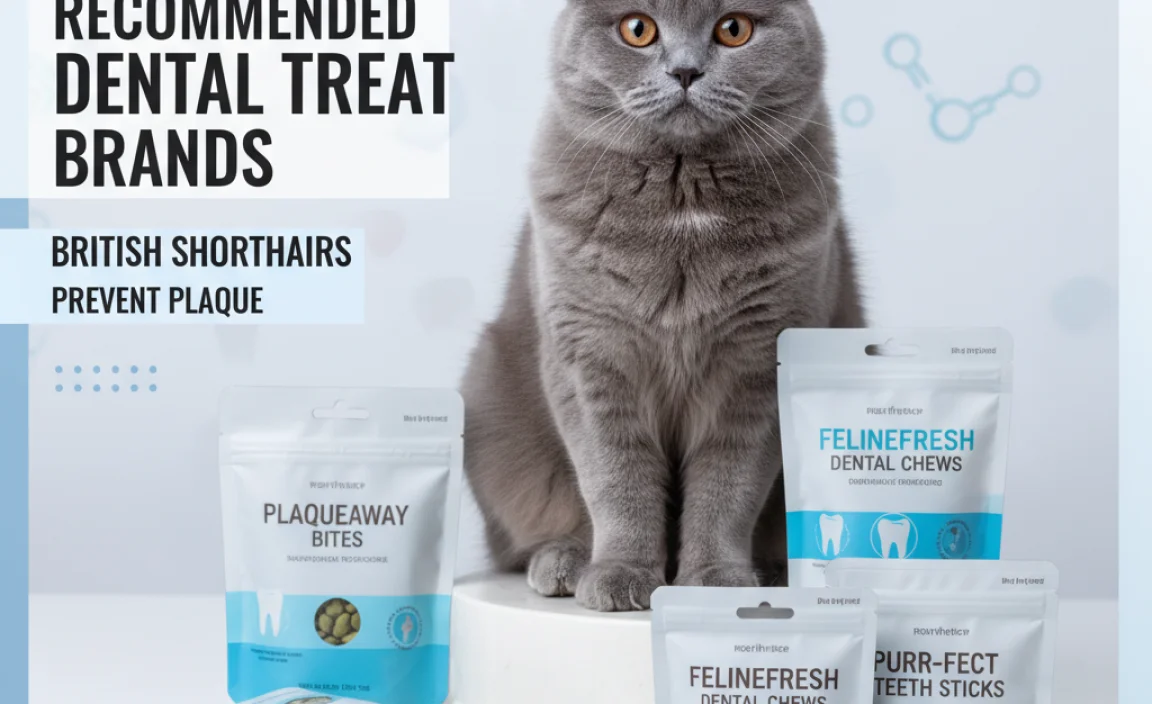
Based on the criteria above, here are a few VOHC-approved dental treat brands that are generally well-received by cats:
- Greenies Feline Dental Treats: These are widely available and come in a variety of flavors. They have a unique shape and texture designed to clean teeth.
- Purina DentaLife Cat Treats: These treats have a porous texture that helps to scrub teeth as your cat chews.
- Hill’s Prescription Diet Dental Care Chews: Available through your veterinarian, these treats are formulated to reduce plaque and tartar buildup.
Always check the ingredient list and nutritional information to ensure the treats are a good fit for your British Shorthair’s specific needs. If your cat has any allergies or sensitivities, consult with your veterinarian before introducing a new treat.
How to Introduce Dental Treats to Your British Shorthair
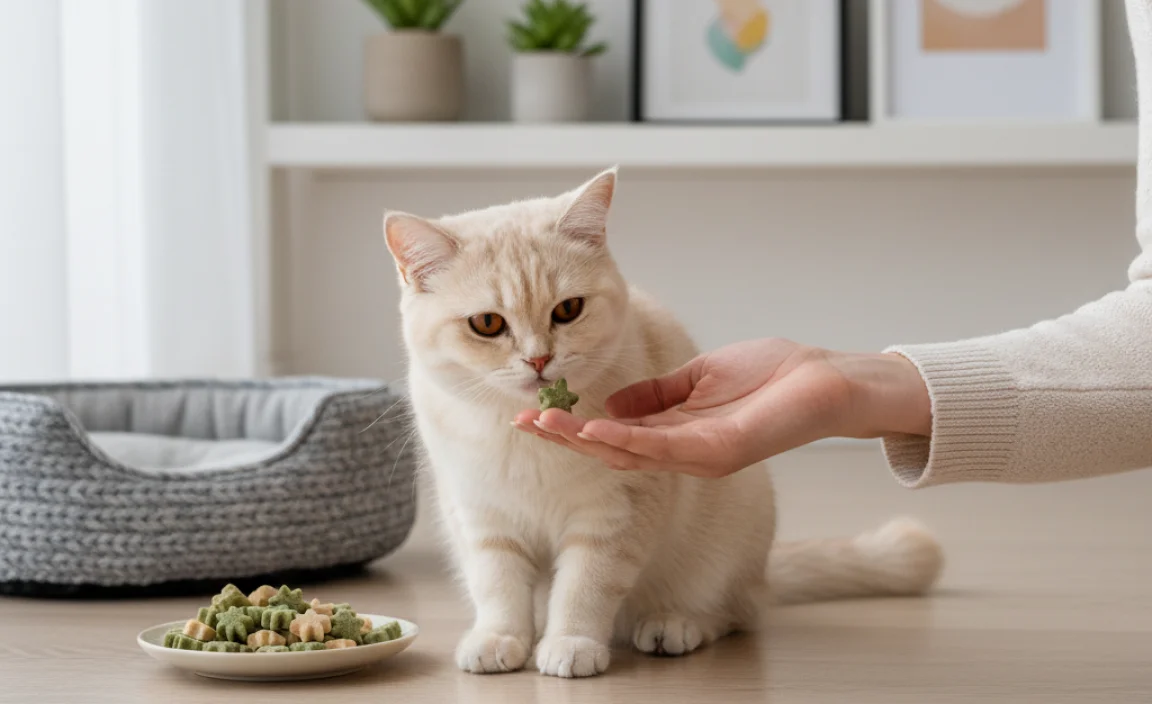
Introducing dental treats to your British Shorthair should be a gradual and positive experience. Here’s a step-by-step guide:
- Start Slowly: Offer one or two treats per day to start. Observe how your cat reacts and adjust the amount accordingly.
- Make it a Reward: Give dental treats as a reward for good behavior, such as after a grooming session or playtime.
- Mix it Up: If your cat is hesitant, try mixing the dental treats with their regular food.
- Be Patient: Some cats take time to adjust to new treats. Don’t give up if your British Shorthair doesn’t immediately love them.
- Monitor Chewing: Always supervise your cat while they’re eating dental treats to ensure they’re chewing properly and not swallowing them whole.
The Importance of a Multi-Faceted Approach to Dental Care
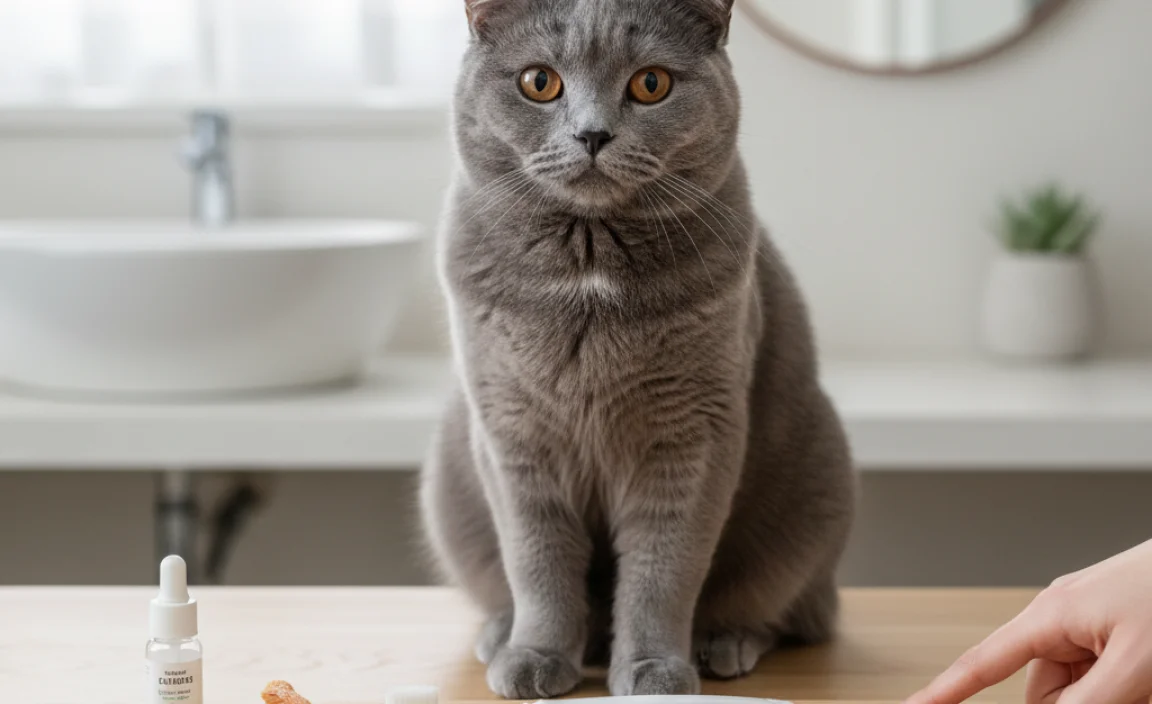
While dental treats can be a valuable tool in preventing plaque and tartar buildup, they’re not a substitute for other essential dental care practices. A comprehensive approach to your British Shorthair’s dental health should include:
- Regular Brushing: Brushing your cat’s teeth is the gold standard for preventing dental disease. Aim to brush daily, or at least a few times a week.
- Professional Cleanings: Schedule regular dental cleanings with your veterinarian. These cleanings remove stubborn plaque and tartar buildup that brushing and treats can’t reach.
- Dental Diets: Consider feeding your British Shorthair a dental-specific dry food. These diets are formulated with larger kibble sizes and special textures to help clean teeth as your cat eats.
- Dental Wipes and Solutions: Some dental wipes and solutions can help remove plaque and freshen breath.
DIY Dental Care for Your British Shorthair
While commercially available dental treats are convenient, you can also incorporate some DIY methods into your British Shorthair’s dental care routine. Always consult with your veterinarian before making significant changes to your cat’s diet or care regimen.
DIY Dental Treat Ideas
While not specifically “treats,” certain foods can contribute to dental health:
- Raw Chicken Necks (supervise closely!): Some raw feeders give raw chicken necks as a chew. The bone and cartilage can help scrape teeth, but this should only be done under strict supervision due to the risk of choking or salmonella.
- Dental-Friendly Cat Food Recipes: Look for recipes that incorporate crunchy elements and are low in sugars or sticky carbohydrates.
DIY Dental Cleaning Methods
- Coconut Oil: Some owners gently rub coconut oil on their cat’s teeth and gums. Coconut oil has antibacterial properties and may help reduce plaque.
- Baking Soda Paste: A very diluted baking soda paste (mixed with water) can be gently applied to the teeth with a soft brush. However, be cautious as baking soda can be abrasive and should not be swallowed in large quantities.
Potential Risks and Precautions
While dental treats are generally safe for cats, it’s important to be aware of potential risks and take necessary precautions:
- Choking Hazard: Choose treats that are appropriately sized for your British Shorthair and always supervise them while they’re chewing.
- Allergies and Sensitivities: Be mindful of any allergies or sensitivities your cat may have and choose treats accordingly.
- Calorie Intake: Dental treats should be factored into your cat’s daily calorie intake to prevent weight gain.
- Underlying Dental Issues: If your British Shorthair has existing dental problems, such as loose teeth or severe gum disease, consult with your veterinarian before giving them dental treats.
Decoding Dental Treat Labels
Understanding the information on dental treat labels is crucial for making informed choices. Here’s what to look for:
| Label Element | Description | Why It Matters |
|---|---|---|
| VOHC Seal | Indicates that the product has been tested and proven effective in reducing plaque and tartar. | Ensures the product delivers on its dental health claims. |
| Ingredient List | Lists all ingredients in descending order by weight. | Helps you identify potential allergens or ingredients you want to avoid. Look for beneficial ingredients like SHMP or zinc gluconate. |
| Guaranteed Analysis | Provides information on the levels of protein, fat, fiber, and moisture in the treat. | Helps you assess the nutritional value of the treat and ensure it aligns with your cat’s dietary needs. |
| Feeding Guidelines | Provides recommendations on how many treats to give your cat per day based on their weight and activity level. | Helps you avoid overfeeding and ensure your cat is getting the appropriate amount of treats. |
| Expiration Date | Indicates the date by which the treat should be used to ensure freshness and quality. | Ensures you’re giving your cat a safe and effective product. |
Long-Term Dental Health Strategies
Maintaining your British Shorthair’s dental health is a long-term commitment. Here are some strategies to incorporate into your routine:
- Establish a Routine: Make dental care a consistent part of your British Shorthair’s daily or weekly routine.
- Regular Checkups: Schedule annual or bi-annual dental checkups with your veterinarian.
- Monitor for Changes: Be vigilant about monitoring your cat’s teeth and gums for any signs of dental problems, such as bad breath, excessive drooling, or difficulty eating.
- Adjust as Needed: As your British Shorthair ages, their dental needs may change. Work with your veterinarian to adjust their dental care plan accordingly.
The Link Between Diet and Dental Health
Your British Shorthair’s overall diet plays a significant role in their dental health. Here’s how:
- Dry Food vs. Wet Food: Dry food is generally better for dental health than wet food, as the kibble can help scrape plaque off the teeth.
- Sugar Content: Avoid foods and treats that are high in sugar, as sugar can contribute to plaque formation.
- Balanced Nutrition: A balanced diet that provides all the necessary nutrients is essential for maintaining healthy teeth and gums.
Common Mistakes to Avoid
Here are some common mistakes to avoid when it comes to your British Shorthair’s dental care:
- Relying Solely on Treats: Dental treats are a helpful supplement, but they shouldn’t be the only form of dental care.
- Ignoring Bad Breath: Bad breath is often a sign of underlying dental problems and should be addressed by a veterinarian.
- Using Human Toothpaste: Human toothpaste contains ingredients that are toxic to cats. Always use toothpaste specifically formulated for pets.
- Neglecting Professional Cleanings: Even with regular brushing and dental treats, professional cleanings are necessary to remove stubborn plaque and tartar.
Advanced Dental Care Options
In some cases, your British Shorthair may require more advanced dental care. Here are some options to discuss with your veterinarian:
- Dental X-rays: X-rays can help identify underlying dental problems that are not visible during a routine exam.
- Tooth Extractions: If a tooth is severely damaged or diseased, extraction may be necessary.
- Root Canals: In some cases, a root canal can save a damaged tooth.
- Dental Sealants: Sealants can be applied to the teeth to help prevent plaque and tartar buildup.
Frequently Asked Questions
1. Are dental treats a substitute for brushing my British Shorthair’s teeth?
No, dental treats are not a substitute for brushing. They are a supplement to help reduce plaque and tartar, but brushing is still the most effective way to clean your cat’s teeth.
2. How often should I give my British Shorthair dental treats?
Follow the feeding guidelines on the treat packaging. Usually, one to a few treats per day is sufficient. Adjust based on your cat’s weight and overall calorie intake.
3. Can kittens have dental treats?
It depends on the treat and the kitten’s age and development. Some treats are formulated for kittens, but always check the packaging and consult with your veterinarian to ensure they are age-appropriate and safe.
4. My British Shorthair has sensitive teeth. Can they still have dental treats?
Yes, but choose treats with a softer texture and avoid hard or overly crunchy options. Consult with your veterinarian for recommendations tailored to your cat’s specific needs.
5. How do I know if a dental treat is working?
Look for a reduction in bad breath and visible plaque buildup. Regular checkups with your veterinarian are also essential to assess the effectiveness of the treats and overall dental health.
6. Are there any side effects of dental treats?
Some cats may experience digestive upset if they eat too many treats. Always follow the feeding guidelines and introduce new treats gradually. If you notice any adverse reactions, discontinue use and consult with your veterinarian.
7. My cat just swallows the treats whole! Are they still effective?
No, if your cat swallows the treats whole, they won’t be as effective at cleaning their teeth. Try breaking the treats into smaller pieces or choosing a different brand with a more appealing texture.
Conclusion
Maintaining your British Shorthair’s dental health is a crucial part of responsible pet ownership. By choosing the right dental treats, establishing a consistent dental care routine, and working closely with your veterinarian, you can help keep your furry friend’s smile bright and their overall health in tip-top shape. Remember, those pearly whites aren’t just for show; they’re essential for a happy and healthy life. So, go ahead and give your British Shorthair a dental treat – they’ll thank you with purrs and healthy gums!
